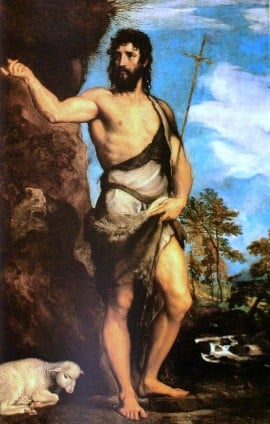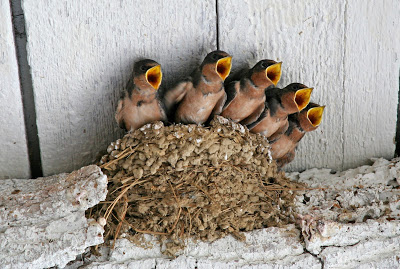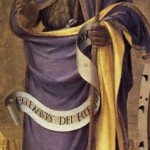 Here comes John the Baptist again. He’s as regular as swallows returning to Capistrano, as salmon swimming upstream to spawn. John steps up each Advent in the knick of time, announcing, always announcing, that all hell is breaking loose and God is in no mood to hand out free passes to anyone anymore.
Here comes John the Baptist again. He’s as regular as swallows returning to Capistrano, as salmon swimming upstream to spawn. John steps up each Advent in the knick of time, announcing, always announcing, that all hell is breaking loose and God is in no mood to hand out free passes to anyone anymore.
John says the axe (and he means God’s axe) is laid at the root of the tree (and he means Israel). He warns us how easily we can all be replaced: God can raise up children from these stones, he says, pointing to the rocky road they’ve travelled on.
People listened to him because they already suspected it was true, and they’d come to hear him because they were damned angry about it. And scared. So, in some ways, John the Baptist is a first century Donald Trump, speaking to folks who are fed up.
John’s loud. He regularly had crowds of tens of thousands, the Roman historian Josephus said, so he had to have a voice that could fill a stadium. And he’s incredibly sure of himself. You can’t read the passages about him without hearing that arrogance in him. He curses, he denounces, he decries. He rings down destruction. His critiques of the government are devastating.
 When he has everybody’s attention, when a hush has fallen over the aching, angry crowd, someone calls out: What shall we do? And he answers. But this isn’t Donald Trump speaking, now. No, he’s turned into — Bernie Sanders. His answer is practical, reasonable, economic, and most of all, full of hope: You who have two coats, give one away to someone who has none, he says. You who have two loaves of bread, do likewise. Behave fairly, treat people justly, no matter what job you have.
When he has everybody’s attention, when a hush has fallen over the aching, angry crowd, someone calls out: What shall we do? And he answers. But this isn’t Donald Trump speaking, now. No, he’s turned into — Bernie Sanders. His answer is practical, reasonable, economic, and most of all, full of hope: You who have two coats, give one away to someone who has none, he says. You who have two loaves of bread, do likewise. Behave fairly, treat people justly, no matter what job you have.
The tree root he is pointing to is the economy. The system is corrupt, he has preached, over and over. And they know it is. Change the economy, he urges them, starting now, where you are, with what you have. When you do that, you will no longer be enslaved to the unjust system that has been oppressing you. You will be building a better world. You will be doing what you can, you newly-minted brothers and sisters, and you will no longer be enemies or rivals or unholy to each other. You will be invested in making the crooked places straight and the rough ways smooth. And then you will begin to see the salvation of God.
 We’ve gotten ourselves mired in John’s words about the One who is coming whose shoes he isn’t fit to untie, and we’ve told ourselves this was all he was talking about, that the whole of the man’s message was to point toward Jesus. In this we sell him very short. His message, powerful enough to attract outsized crowds, had to have been far more than “not me, the next guy”. And the gospels record far more of his fiery conviction than that.
We’ve gotten ourselves mired in John’s words about the One who is coming whose shoes he isn’t fit to untie, and we’ve told ourselves this was all he was talking about, that the whole of the man’s message was to point toward Jesus. In this we sell him very short. His message, powerful enough to attract outsized crowds, had to have been far more than “not me, the next guy”. And the gospels record far more of his fiery conviction than that.
The corruption of the economy was at the center of his attention. Leaving Jerusalem was leaving the economy. His camel skin clothing and his diet of honey and locusts were signs of his refusal to participate in the economy. Consider: he does not advise people to eat as he does, nor to wear animal skins, as he does, nor to come and live where he is living. Changing the economy is his answer. We can build a world of hope among us, John is saying, by meeting each other’s needs with our abundance, by removing the terrors of desperation and hatred among us.

Neither does John advise fear or a frenzied, angry response. Changing the economy is the answer to acts of terror, he says, acts such as Herod’s. Mary of Nazareth, Jesus’ mother and John’s cousin, and the other Forerunner who is our Advent guide, rings out the same message: My soul is magnifying God, she says. And she does not leave it at that, but declares the very aspects of God she intends, in this Child, to increase: the God who scatters the proud in the imaginations of their hearts, who brings down the powerful from their thrones and lifts up the lowly, who fills the hungry with good things and sends the rich empty away.
We sell her very short in our preoccupation with her sexuality, and in our refusal to acknowledge in her a first century Elizabeth Warren, a woman who belongs in the prophetic tradition along with Jeremiah and Elijah and John, a woman who moves her motherhood outside the conventional economy of housewifery. She leaves home and bears her child in a stable, among animals. No grandmother, no chums gather round , but a group of gnarly, unkempt shepherds from the fields beyond Bethlehem. She then flees Israel altogether for a few years, living on money from foreign kings until there can be a regime change. She is not meek and she is not submissive. Neither does she advise these actions to any. Her advice is economic justice.
, but a group of gnarly, unkempt shepherds from the fields beyond Bethlehem. She then flees Israel altogether for a few years, living on money from foreign kings until there can be a regime change. She is not meek and she is not submissive. Neither does she advise these actions to any. Her advice is economic justice.
The repentance John advises to the crowds is economic change. The dedication Mary sings about is the same. These actions are hopeful, and in their view, fit preparation for the redemption of the world. Behold: the Lamb of God.
Our destination is never a place, but always a new way of looking at things — Henry Miller
__________________________________________________________________________________________
Illustrations:
1. Swallow – sand marten. Image from Wikipedia, Swallow page.
2. Saint John. by Titian. en.wikipedia.org
3. Capstrano-swallows-babies, Melanie Link Taylor, M.Ed., on the blog Mz Teachuh, educational materials for professional needs.
4. Saint John the Baptist. by Leonardo DaVinci, en.wikipedia.org
5. Salmon Swimming Upstream. Image from commons.wikipedia.org.
6. Mary Singing the Magnificat, by James Tissot. Brroklyn Museum. en.wikipedia.org image.









